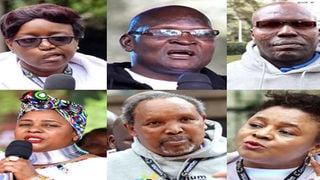
1998 Nairobi bomb blast victims: From left top row) Leonora Atieno, Douglas Sidialo, Enoch Oloo and Ali Mwadama. (Bottom row from left) : Caroline Muthoka , George Ngige, Safula Mwilu and Elijah Odhiambo.
| File | Nation Media GroupNews
Premium
Bomb blast: Heart-rending stories of the forgotten victims of 1998 attack
Exactly 25 years ago, terrorists bombed the US Embassy in Nairobi, leaving over 200 people dead and at least 5,000 injured.
Despite the passage of time, the memories of the attack remain fresh in the minds of survivors.
All they want is a little attention, a little compassion, a little sincerity by the Kenyan and US governments on their plight, and compensation to assuage the pain, suffering and trauma that, like their shadows, follow them wherever they go.
The Nation caught up with a few of the survivors.
Caroline Muthoka – Founder, Consortium of 7th August 1998 victims
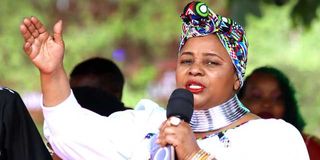
Caroline Muthoka.
It is a day I remember so vividly. I was seven months pregnant at that time, working in my office at Co-operative building when I heard a very big blast.
I got so many cuts and some glass got in my right eye. The building was shaking violently. Then everything went quiet.
After some time, my colleague Lilian Ng’eno helped me to the stairway. Every time we would step on anything, that was a dead person. We somehow got to Nairobi Hospital.
For the first three years, we were helped by US government through medical aid, foodstuffs, a little token for school fees ... then all of that stopped. I am happy with the new plan by the Senate to push for compensation; we need help.
Douglas Sidialo
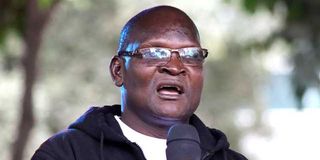
Douglas Sidialo.
August 7, 1998 was a turning point in my life—I became blind.
I was on the busy Haile Selassie Avenue coming from Uhuru Highway. Traffic was slow, and near the intersection of Haile Selassie Avenue and Moi Avenue, a truck took a turn and went towards the American Embassy.
There was an altercation between the truck driver and a security agent. Then I heard what I thought was gunshots but was actually hand grenades, I later learnt. Then I saw a man running away from the truck towards Haile Selassie Avenue. Then blast went off.
From that day, I have never seen the light of day. I was taken by Good Samaritans to Kenyatta National Hospital, doctors and even experts from Germany were flown in to help rescue my eyesight, but to no avail.
Two months later, I was discharged. I was told that after six months, I would regain my sight. I have been waiting for the last 25 years for that miracle to happen.
I have helped profile the case of the victims globally. I served as the first chairman of the victims’ association and prevailed upon the US to compensate us. The American Congress passed a Bill to release some $47 million, but unfortunately, it went to businesses and buildings, and not lives.
I went to Oklahoma City in 2000 to have an exchange with American leaders and have them help us. We met senators, the black caucus, later we went and laid a wreath to honour the victims of the September 11 attacks. I even did a bike ride from Ground Zero in honour of the families who lost their loved ones in the September 11 attack, but it never worked.
I have even climbed Mt Kilimanjaro hoping by being at the highest point in Africa ... the American government will listen, but to no avail. I rode a bike across Africa, covered over 12,000 kilometres in 95 days hoping ...
I met (US President) Joe Biden years back, shook hands with him asked him about the issues of the victims, he assured me that America is a believer in human rights and they will look into the issue. Now, 12 years later, he is the President.
It might take us a century but I believe our children will live to know that this struggle was not in vain. I want the American people to be convinced that the Kenyan victims of the bomb blast have to be compensated.
George Ngige
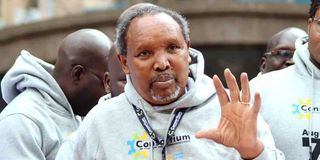
George Ngige.
I remember I had just alighted from a bus at the railways bus station and I was going to Merchant Bank, just behind the Co-operative building, which we used to call bell-bottom house. It was while I was passing the building that I heard something like a gunshot.
As I was still about going to check, a very big blast followed. Before I knew it, I was in the air ... I survived but my spine was injured and to date, I have never been able to stand straight and walk with crutches.
We are suffering from being neglected by the Kenyan and US governments. The US government supported Amref and Amref paid for our medication, but we have suffered the neglect of our previous governments.
I was elected the chairman of the bomb blast victims in 2013. I contacted the office of then President Uhuru Kenyatta and also wrote to several Cabinet secretaries. I met many, but Uhuru never accepted our appointment. We appeal to President William Ruto to show the world that he cares.
Ali Mwadama – Chairperson of the August 7, 1998 bomb blast victims in Kenya
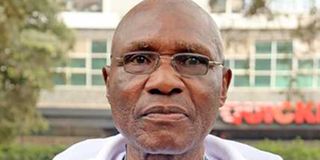
Ali Mwadama.
I was seriously injured. My head had to be stitched severally for me to be here. I was at Development House where the National Bank of Kenya was.
We appeal to the US and Kenyan governments to look into our matter. We request President Ruto and his US counterpart Joe Biden to humbly hear us.
We need medication, we need therapy. Some of us still have glasses in our eyes, the surgeries need money. I beseech President Ruto’s and Biden’s administrations to work together and compensate us. I thank our senators for doing due diligence and have promised to check into our affairs. We are really suffering.
Safula Abdi Mwilu – Widowed during the blast
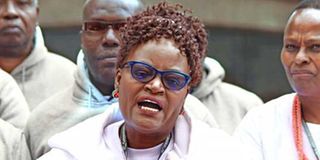
Safula Abdi Mwilu.
I brought my husband to work at Merchant Bank, just adjacent to the Embassy. He then sent me to Aga Khan Hospital to pick some test results—he had suffered a stroke earlier.
Since the report was not ready, I called my husband. He told me there was a commotion and he was trying to figure out what was happening. He said: “I will call you back.” I am still waiting for him to call back.
We have suffered as widows since that day. The US Embassy compensated their own, people who worked at the Embassy, but the Kenyans have never been compensated. People think we have millions in our accounts but we were left broke. We want our government to push for this compensation.
Enoch Oloo
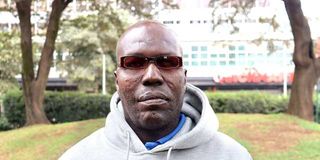
Enoch Ochoo.
I was coming from Nairobi West to town in a bus. When we heard the blast, still in the traffic jam, we thought it was a tyre burst. The next second, I found myself amid corpses.
My mouth was torn, I did not have one eye, some of my teeth had fallen off and my entire face was bleeding profusely. My neck was bleeding. I was rushed to hospital.
In the hospital, I heard a nurse say he could not see my Adam’s apple and I would surely die. I just told him to do his best and God would do the rest. That is how I survived.
To date, we still suffer the consequences of the bombing. Our children even stopped going to school, the orphaned ones dropped out of school, some have fallen to drug abuse because they gave up on life. You may see our faces smiling but deep down, our hearts are only filled with tears. Please, someone has to look into our affairs.
Leonora Atieno – Representative of TSC workers affected by blast
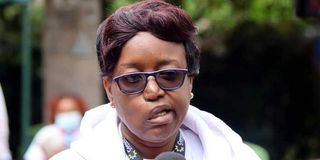
Leonora Atieno.
I was working at the Teachers Service Commission offices in the Co-operative building. I was on the 15th floor when I heard the blast.
I hurriedly rushed to the window to check what had happened and was thrown down on the floor. I got several pieces of glass in my body; I was bleeding profusely.
I have been having problems with my body since, particularly on my right side. In 2019, a piece of glass was taken from my right shoulder. In 2021, another piece of glass was removed from my right eye. I have been having problems with my nerves and I am on constant medication.
I would really love the Kenyan government to follow up on the compensation.
Oscar Okinya
I was in the adjacent building. I was newly employed, still on probation at Merchant Bank. When the grenade went off, I was writing a cheque. I didn't want to go check the cause of the sound. Everyone who went to check, passed away.
Our building collapsed on us. I didn’t hear the bomb.
Life after the blast was very difficult. I developed mental stress and post-traumatic stress disorder. I also developed a condition that makes me give off an offensive odour.
Because of this I faced a lot of rejection, including in the bank where I worked.
People are excited because of the possibility of compensation but I don’t want money. I just want my health back. I want this horrible smell to be investigated and a solution found. It could be something that’s treatable but the doctors here don’t know. I've been advised to seek medical attention abroad, unfortunately I don't have the resources.
I am 45 years now, never married, haven’t dated in years, can’t even go to church without offending others, hidden away in loneliness. What happens when I grow old? Will this be my life? Please help me get the US Embassy to assist me get medical attention. That’s all I ask.






